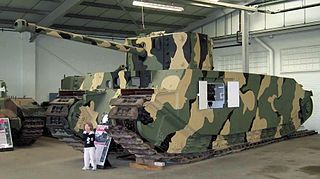TOG2
| Tank Heavy, TOG II | |
|---|---|
|
TOG II* at The Tank Museum, Bovington
|
|
| Type | super-heavy tank |
| Place of origin | United Kingdom |
| Production history | |
| Designed | 1940[1] |
| Manufacturer | William Foster & Co.[1] |
| Produced | 1941[1] |
| Number built | 1 prototype |
| Specifications (TOG 2*) | |
| Weight | 80 long tons (81.3 metric tons)[2] |
| Length | 10.13 m (33 ft 3 in)[2] |
| Width | 3.12 m (10 ft 3 in)[2] |
| Height | 3.05 m (10 ft 0 in)[2] |
| Crew | 6 (Commander, gunner, 2 loaders, driver, co-driver) |
|
|
|
| Armour | 114 mm at the front of the turret 76 mm at the sides and front hull and 50 mm at the rear of the tank cemented armour on 0.5 inch mild steel |
|
Main
armament |
QF 17 pdr (76.2 mm) gun |
|
Secondary
armament |
7.92 mm Besa machine gun |
| Engine | Paxman-Ricardo 12-cylinder diesel-electric 600 hp (450 kW) |
| Transmission | 2 electric motors |
| Suspension | unsprung (TOG II) torsion bar (TOG II*) |
|
Operational
range |
50 mi (80 km)[2] |
| Speed | 8.5 mph (13.7 km/h)[2] |
The Tank, Heavy, TOG II was a prototype British tank design produced in the early part of the Second World War in case the battlefields of northern France devolved into a morass of mud, trenches and craters as had happened during the First World War. When this did not happen the tank was deemed unnecessary and the project terminated.
A development of the TOG1 design, only a single prototype was built before the project was dropped.
History
The second design to come out of the Special Vehicle Development Committee (nicknamed "The Old Gang" as it was made up of people who had worked on the original British tanks of the First World War) the TOG 2 was similar to the TOG 1 and kept many of its features. Instead of the track path arrangement of the TOG 1 which - like that of the First World War British tanks - ran up over the top of the hull and back down, the track path was lower on the return run and the doors were above the tracks. Ordered in 1940, built by Foster's of Lincoln, the prototype ran for the first time in March 1941.
The design included a 6-pounder gun and side sponsons. Initially fitted with a mockup turret with a dummy gun, in 1942 it was given a turret that was under development for the Cruiser Mk VIII Challenger tank design with the QF 17-pounder (76.2 mm) gun. The turret "in modified form" was used on the Challenger. The planned sponsons were never fitted.[3][4]
Although equipped with the same electro-mechanical drive as originally fitted to the TOG 1, the TOG 2 used twin generators and no problems were reported. It was modified to include, among other things, a change from the unsprung tracks to a torsion bar suspension and went through successful trials in May 1943. No further development occurred, although a revised version, the TOG 2 (R) was proposed. The 'R' would have been 6 ft (1.8 m) shorter, used torsion bar suspension and had no sponsons.[3]
The TOG 2 can be seen at the The Tank Museum.
See also
References
- Notes
- Bibliography
- Chamberlain, P; Ellis, C; British and American Tanks of World War II, 1969, Arco Publishing
- White BT, British Tanks 1915-1945 Ian Allen
- Lua error in package.lua at line 80: module 'strict' not found.
